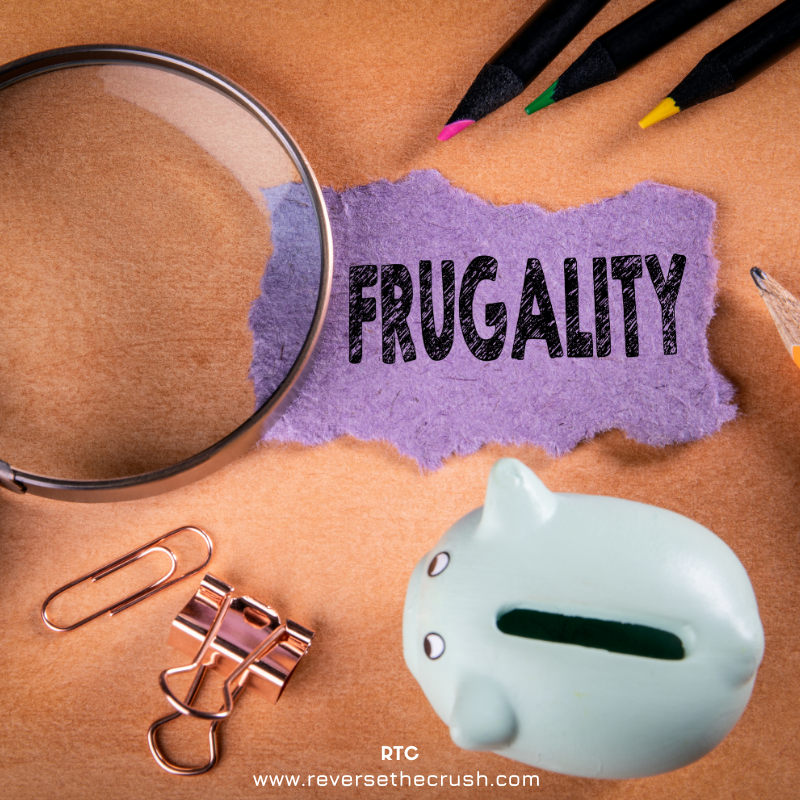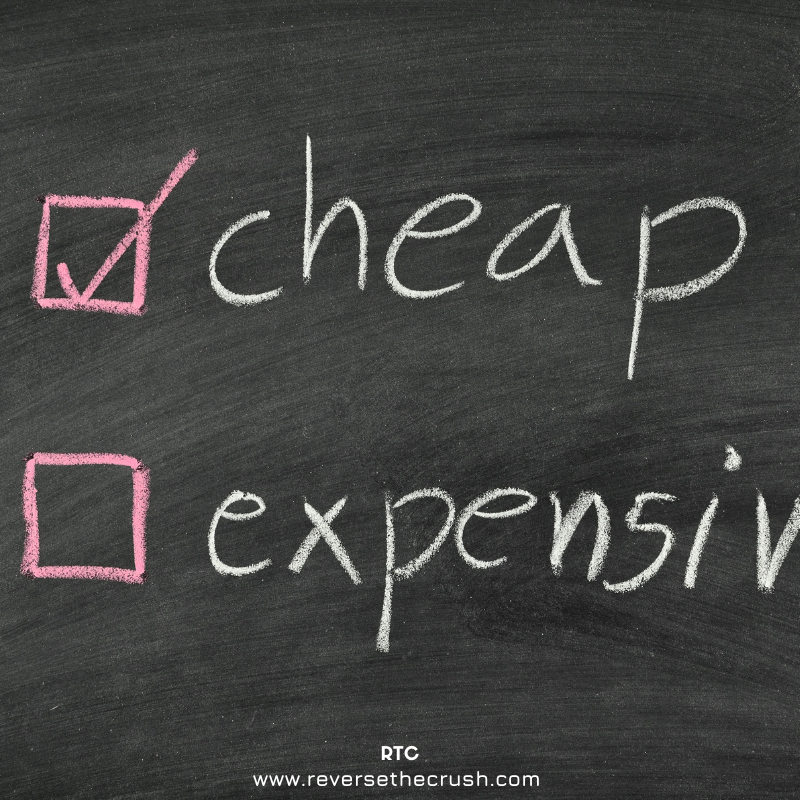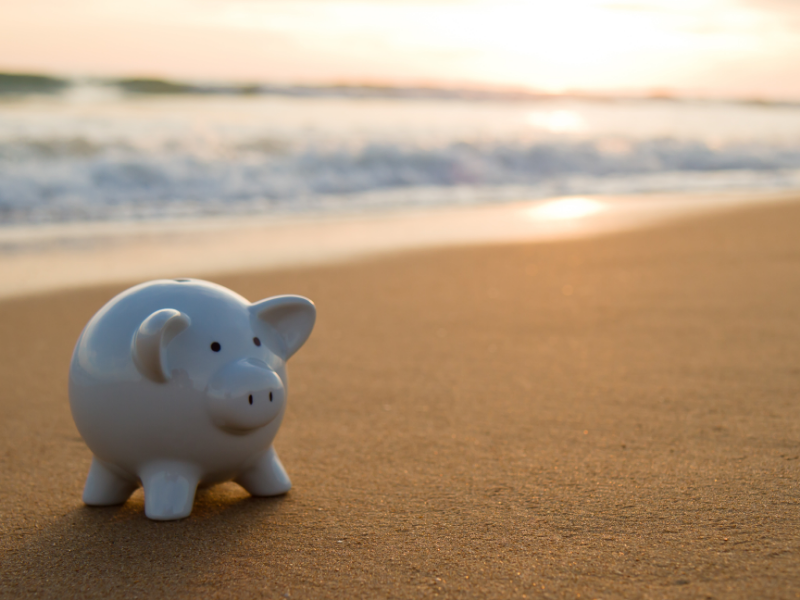Frugal vs Cheap: There’s a difference between being frugal and being cheap. Frugal focuses on value, being cheap only attempts to pay less.
From time to time, I’ll watch TLC’s Extreme Cheapskates on YouTube.
In case you haven’t seen it, it’s a reality T.V. show that follows outrageously cheap people’s lives.
I mean, these cheapskates will do anything to save money, even disgusting stuff. They dumpster dive, eat co-worker’s leftover food and live in cars, to name a few of the things they do.
On the other hand, frugal people are smart with money.
Being frugal is totally different than being cheap, but these two terms are often misunderstood.
In this post, I will explore the difference between being frugal vs cheap. In turn, you will be able to tell the difference between a smart, frugal individual compared to a penny-pinching cheapskate.
Let’s get started with a frugal vs cheap overview:
Frugal vs Cheap

What does it mean to be Frugal?
Simply put, being frugal means you are conscientious with money.
Frugality means you want to do what is right and make the most responsible financial decisions.
A frugal person will spend money on what provides the greatest value. However, they will not be willing to spend much money on what does not add value.
Although a frugal person is concerned about cost, they are equally concerned about quality.
When deciding on a purchase, a frugal individual will consider the cost, quality, and time it will require. Frugal folks realize you get what you pay for.
In addition, a frugal person finds a way to pay less while not sacrificing the quality of life.
Frugal Overview:
- Conscientious with money.
- Responsible financial decisions.
- Spends money on values.
- Concerned about quality.
- Considers time.
- Will not sacrifice quality of life.
- Will not waste money if it doesn’t add value.
What does it mean to be Cheap?
To be cheap means you only care about paying less or nothing at all. Alternatively, it could mean you only care about making more money.
It means you don’t consider any other factors besides price.
A cheap person believes the quality of all products are the same.
They don’t care about brand, quality, aesthetics, how much value it will bring, or how much time it will take.
A cheapskate only cares if it’s the absolute lowest cost or if it’s free. They will sacrifice the quality of their lifestyle for something that costs less.
Ironically, cheap people occasionally spend money on sales for items they don’t need because they can’t resist a deal. A frugal person would never buy something they don’t need. They wouldn’t dare!
In some ways, being cheap can be downright stupid, as some cheapskates don’t realize the value of time.
For example, spending an hour on the phone to get $0.50 back is not worth the time if you can make $50 with that hour.
Similarly, waiting in line to get something slightly cheaper is not worth the time if you’re willing to work hard enough to make more money.
Cheap Overview:
- Only cares about paying less.
- Doesn’t consider other factors besides price.
- Doesn’t care about quality.
- Will sacrifice lifestyle.
- Spends money on deals and sales they don’t need.
- Doesn’t care about aesthetics.
- Willing to waste time.

Frugal vs Cheap – How To Tell The Difference
In my estimation, there are five different factors that tell the difference between being frugal vs cheap.
Let’s take a closer look at the five factors:
Time: Frugal values time, cheap doesn’t care how long it takes to save a dollar
Life comes down to time and money.
Time is money, money is time.
You must trade your time to make money. But once you have enough money, you have more time. This is the essence of financial independence.
In relation to the frugal vs cheap debate, frugality values time while being cheap does not.
In some cases, it might make sense to pay more if the time it takes will cut into your income.
On the other hand, a cheap individual would wait in a lineup for half a day just to save a few dollars. They mostly just want to tell others about the deal.
Simply put, choosing to be cheap fails to realize wasting time could be more costly.
Health: Frugal prioritizes health, cheap only cares about what cost the least
If you’re willing to jeopardize your health to save money, you are a cheapskate.
Saving money through unhealthy eating, poor hygiene, or poor maintenance is not a recipe for success.
In the long run, sacrificing health will lead to not living as long. In turn, you will not experience the benefits gained by having money. You could pass away before you get to spend it, or you won’t live to see your investment’s growth anyways.
But if you are willing to spend money on your health, you will live longer to experience the benefits of being wealthy.
Quality: Frugal will pay more for quality, cheap only cares about price.
When I was 21, I bought a really nice HP laptop for college. It cost around $700 and worked well for a while. But after two years, the screen became glitchy, the battery wouldn’t last, and it frequently lost wi-fi.
After only 2 years, I had to buy another laptop again. This time I bought a gaming laptop by Toshiba. It cost just over $1,000 with tax. But again, after only 1 year, I began having issues with it.
By this point, in late 2014, I was completely fed up with PC laptops. So, I decided to spend a little more and get a Macbook. I wanted one for years.
Guess what happened next? Nothing, because I’m still using the MacBook I bought in 2014 right now to write this post. I have never had one single problem.
In short, you get what you pay for. Although a frugal person does care about price, they realize it makes sense to spend more money in some cases. They do their research. The product might last longer which will ultimately cost less money.
A cheapskate doesn’t think about how long a product will last, what it looks like, or about any specific details. They just want the lowest price.
Relationships: Cheapskates care about money over relationships
Money isn’t everything.
It’s really just a bartering system.
A frugal person realizes this. They realize that they can improve the quality of life by spending less on what doesn’t bring value.
And in some cases, a frugal person may need to make personal sacrifices for the sake of the relationships in their life.
With a cheapskate, though, they are not willing to make sacrifices for relationships. They care more about money and expect others to adapt to them.
Of course, it’s ok to have values such as not wanting to spend money on coffee. It’s alright to save money on groceries.
However, you don’t want to take that too far. Don’t avoid trips, occasional dinners, or simple pleasures just to save a buck at the expense of your relationship. It’s not worth it.
Deprivation: Frugality does not deprive a reasonable life, cheap is the bare minimum.
Life is short.
To my knowledge, we only get one life.
Furthermore, life is filled with individual challenges and tragedies.
Therefore, it doesn’t make sense to deprive yourself just to stack up dollars in a high interest savings account.
There must be a purpose to save money—some goal like early retirement or to fund a business.
But at the same time, since the next day is not promised, there is no point in depriving yourself.
Hence why a frugal person focuses on values. They are willing to spend money on what they are passionate about and what they enjoy. They don’t hold back. But when it comes to things that don’t add value, they are stingy.
Depriving your life is the cheapskate thing to do.

Frugal vs Cheap – Concluding Thoughts
Personally, I fall under the frugal category.
I’m not naturally frugal, though, which is why I have to pay myself first to get ahead financially.
Over time, I have become frugal because it seems logical.
To conclude my thoughts on being frugal vs cheap, I urge you to become more conscientious with your money. However, don’t let money consume you. The lowest price is not always the best option.
Related:
Pay Yourself First – How To Pay Yourself First
5 Expenses to Cut-Out to Increase Cash Flow
Save Money on Groceries – 14 Highly Effective Ways to Reduce Grocery Costs
I am not a licensed investment or tax adviser. All opinions are my own. This post may contain advertisements by Monumetric. This post may also contain internal links, affiliate links to BizBudding, Amazon, Bluehost, and Questrade, links to trusted external sites, and links to RTC social media accounts.
Connect with RTC
Twitter: @Reversethecrush
Pinterest: @reversethecrushblog
Instagram: @reversethecrush_
Facebook: @reversethecrushblog
Email: graham@reversethecrush.com


 Investing Mistakes: (7) Investment Mistakes You Should Never Make
Investing Mistakes: (7) Investment Mistakes You Should Never Make
